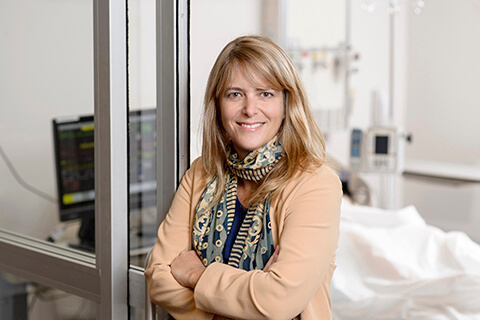Purdue Profiles: Wendy Kline
October 6, 2015
 |
|
Wendy Kline, the Dema G. Seelye Chair in the History of Medicine. (Purdue University photo/John Underwood) |
Wendy Kline is internationally recognized for her scholarship in the history of medicine, history of women's health and the history of childbirth. She is the author of "Bodies of Knowledge: Sexuality, Reproduction, and Women's Health in the Second Wave" and "Building a Better Race: Gender, Sexuality, and Eugenics from the Turn of the Century to the Baby Boom."
Kline arrived in 2014, as the Dema G. Seelye Chair in the History of Medicine. She is planning a study abroad program in France to look at war and medicine and has or is teaching "History of Public Health," "Women and Health in America," "Death, Disease, and Medicine in the 20th Century," and "Sex, Race, and Science." The Dema G. Seelye Chair in the History of Medicine was funded by an anonymous donor to help establish a nationally recognized program focused on the history of science, medicine and technology.
What is the history of medicine?
The history of medicine field is primarily made up of historians. It was started in the 1920s by medical doctors who wanted to write about and celebrate the great surgeons in their field. Initial scholarship and literature celebrated medicine and science. But, thanks to the social movements of the 1960s and 1970s, scholars started thinking about the history of medicine as being more than praising good doctors and medical practices. Historians started looking at asylums, patient diaries, the social history of disease and the sanitation movement. The result was exploring the impact of authority on medicine and that impact on the community.
Today, it's important for students who are going into health professions to understand that their profession has a history. Things that they take for granted about their field can really affect how they approach their career or and even how they practice. It also introduces other students to a new way of looking at the past, such as how anxieties about outsiders and fears of disease and contagion have affected immigration restriction."
Why are you interested in the history of medicine?
The history of medicine is a window into the past that many people do not think about. Personally, I was really drawn into medicine's authority and power and what that meant for patients. I started looking at the role of eugenics in policing female sexual behavior, in the form of eugenic sterilization laws. Scholars had never looked at the role of gender and sexuality in the eugenics movement, and so the resulting publication, "Building a Better Race," generated a great deal of attention. My second book, "Bodies of Knowledge," is a history of the recent women's health movement, and investigates the activists who challenged the role of medicine and doctors, as well as advocates who forced a new conversation between patients and doctors
What are you currently working on?
I'm working on a book about the politics of birth and the emergence of the midwifery movement in the 1970s. It's really a story about the creation of a profession. The book is currently under contract with Oxford University Press. Because of my previous work on women's health activism, many individuals who have played a crucial role in challenging the medicalization of birth have shared their diaries, birth records, notes and news clippings with me so I can tell their story. These women were aware that what they were doing was important and also dangerous because it was even illegal at times. I also received a grant from the American College of Obstetricians and Gynecologists so I could review historical professional documents to see what the medical response was to underground midwifery. While the practice of out-of-hospital remains a highly controversial subject, it's a procedure, which is growing in frequency, and so its history needs to be understood. Like many social movements whose actions generate a great deal of media attention, its history actually involves a great deal of collaboration, and not just conflict, between midwives, doctors, and women in labor.
Some might be surprised to hear that you are a professional violin player.
I play with the Lafayette Symphony Orchestra. I taught my first class at Purdue last year then did my audition on the stage of the Long Center for the Performing Arts that afternoon. I've been playing the violin since I was 4. Interestingly, my musical background also plays a part in why I am interested in medical history. When I was 16, I was quite serious about the violin and I practiced for hours every day. My left arm was in pain and I lost feeling in my fingers, and I saw a number of doctors who all had different diagnoses. Finally, one doctor realized that I had an extra rib in my neck, which is called cervical outlet syndrome, and I had a serious operation to remove it. After so many differing diagnoses I realized for the first time that doctors could not fix everything.
I love playing the violin, and playing in professional quartets and symphonies is how I made my living through graduate school. Today it's a great balance of my interests.
Writer: Amy Patterson Neubert, 765-494-9723, apatterson@purdue.edu

